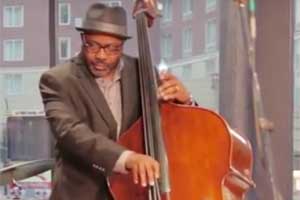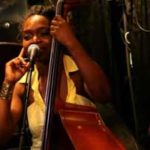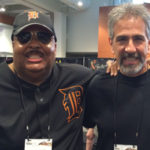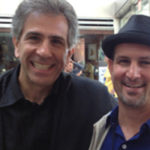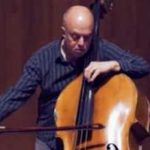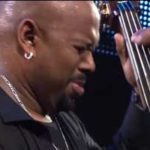Michigan State University professor of jazz studies has shared the stage with Wynton Marsalis, Roy Hargrove, Diana Krall and Chick Corea
Exclusive interview with FBPO’s Jon Liebman
October 26, 2009
Detroit native Rodney Whitaker is one of the world’s foremost jazz double bass performers. In addition to holding down the bass chair for the Wynton Marsalis Sextet and the Lincoln Center Jazz Orchestra for seven years, Rodney has also performed with Roy Hargrove, Dianne Reeves, Mulgrew Miller, Diana Krall, Terence Blanchard, Hank Jones, Marian McPartland, Kenny Burrell, Bob James, Benny Golson, Tommy Flanagan, Betty Carter, Curtis Fuller, Dizzy Gilispie, Johnny Griffin, Joshua Redman, Pat Metheny, Chick Corea and countless other world renowned jazz artists.
Now based in East Lansing, MI, Whitaker is Director of Jazz Studies and Associate Professor of Jazz Bass at Michigan State University. He also serves as director of the Detroit Civic Jazz Orchestra, Musical Director for Jazz Education at the Detroit Symphony Orchestra and Director of the “Jazz in the Studio” mentorship program and summer jazz camp with the Arts League of Michigan.
FBPO: Having grown up in metro Detroit myself, I have first-hand knowledge of the tremendous musical legacy that stems from our mutual hometown. What kind of influence did growing up in the Motor City have on you musically?
RW: As a bassist, the first music I remember hearing was Motown. I would have to say James Jamerson was my first influence. For me, it was always about the groove. When I first started playing bass, I played the upright before the electric. So many people in the community made me aware of our rich musical heritage and encouraged me to check out Paul Chambers, Ron Carter, Doug Watkins, Cecil McBee and all the other Detroit bass players. Though all of these great players influenced me, I’d have to say that Paul Chambers influenced me the most.
FBPO: How did the Roy Hargrove and Terence Blanchard gigs come about?
RW: I first met Donald Harrison in February 1988, shortly after my 20th birthday. I was driving to a gig and heard Terence and Donald on the Ed Love show and I invited them to a jam session I was hosting. Donald Harrison showed up and said he loved my bass playing. He told me that their bassist, Reginald Veal, had just gotten the gig with Wynton (Marsalis) and asked me if I wanted to tour with the group. Before I could give him a response, I heard through the grapevine that another Detroit bassist, Bob Hurst, had gotten the gig. Though I was very disappointed, I received a call from Donald the following April and he asked me once again to go on tour with the group, beginning in July1988. I drove to Chicago that May for the official audition and they hired me. In 1989, when the Harrison/Blanchard Quintet broke up, Terence asked me to join his group.
In 1991, I got a call from Sam Newsome, who was a member of the Terence Blanchard Quintet at the time. He invited me to sit in at a jam session at the North Sea Jazz Festival. That was the first time I met Roy Hargrove and he asked me to join his band that very day. I began doing some gigs with him that summer and officially joined his band in the fall of 1991.
FBPO: Was there a turning point that made you realize your career was really starting to take off?
RW: I’d say it was when I joined the Harrison/Blanchard Quintet. That’s when I started to believe I could have a career as a bassist.
FBPO: You studied with the now-deceased Robert Gladstone, principal bassist of the Detroit Symphony Orchestra. Can I assume you started with Simandl and the other widely-used bass method books? How far did you go with your classical playing?
RW: Actually, my first bass teacher was Stephen Molina, now assistant principle bassist of the Detroit Symphony Orchestra. He took me through both Simandl books, as well as some beginning-level concertos and sonatas. I also studied with Marshall Hutchinson. While preparing for my college auditions, I worked on solo repertoire.
I studied with Bob Gladstone when I was a student at Wayne State University in Detroit. We worked on some technical exercises utilizing Zen concepts, encompassing overall mental development, rather than just music. Another one of my earlier teachers was the great jazz bassist Ralphe Armstrong, who really got me going, playing good bass lines and developing a strong walking technique.
FBPO: I bet all those educational experiences came in handy when you landed the job as conductor of the Detroit Symphony Orchestra’s Civic Jazz Orchestra.
RW: Yes, but going back even earlier, my experiences at Martin Luther King High School in Detroit gave me a strong solid musical foundation. I had an opportunity to work with two great instructors, Ed Quick, who was the band director, and Herbie Williams, who was the artist-in-residence at the time. They gave me great examples on how to run a jazz ensemble. In addition, my work with the Lincoln Center Jazz Orchestra for nearly eight years gave me a strong backing on Duke Ellington’s music. All of those things helped me a lot.
FBPO: In addition to your work as a sideman with Blanchard,Hargrove, Antonio Hart, Mark Whitfield and so many others, you’ve released several albums under your own name as a leader or co-leader. Can you talk about some of those?
RW: In 1996, I released Children of the Light on Koch Records. I had Roy Hargrove, Nick Payton, Wallace Roney, Cyrus Chestnut, Geri Allen, Kariem Riggins and James Carter all play on it. In 1998, I recorded Hidden Kingdom for DIW Records. For that one, I used Marcus Belgrave, Ron Blake, James Carter, Peter Martin and Gregory Hutchinson.
The Brooklyn Session: Ballads & Blues came out in 1999 on Criss Cross Jazz, a label out of the Netherlands. Ron Blake, Wycliff Gordon, Stefon Harris, Eric Reed and Carl Allen. Yesterday, Today & Tomorrow was released by the Sirrocco Jazz label in 2000. For that one, I had Victor Goines, Farid Barron, Herlin Riley, as well as special guests Dianne Reeves, Wynton Marsalis, Wess Anderson and Wycliff Gordon. For Winter Moon, which came out in 2004, I used my own quartet, which was made up of Eric Reed on piano, Ron Blake on saxophone and Carl Allen on the drums. That one was also on Sirocco.
My other releases were both co-led by Carl Allen and me and released on Mack Avenue Records. The first was Get Ready, which came out in 2007. In addition to Carl and me, the album had Cyrus Chestnut on piano, Rodney Jones on guitar, Dorsey “Rob” Robinson on organ and Steve Wilson on alto sax.
Our latest Mack Avenue release, Work To Do, came out earlier this year. For that one, we used “Rob” and Rodney again, in addition to Brandon Lee on trumpet, Kirk Whalum and Vincent Herring on saxophone and Vincent Chandler on trombone.
FBPO: You’ve amassed quite a career as a performer, both as a sideman and a leader. What prompted you to become an educator?
RW: I was offered a position at Michigan State University in 1995. In 1996, I began teaching at University of Michigan also. I enjoyed this part of my life. I came to understand that the music was really about helping people fulfill their dreams. At that point, it became an important part of my life.
FBPO: What can you tell me about the jazz program at Michigan State University?
RW: The jazz studies department is committed to the highest level of performance, mentoring, education and community outreach. Our unique curriculum features nationally and internationally renowned faculty members drawn from the highest ranks of the jazz community. All faculty members have performed with top-notch recording and performing artists in jazz.
The jazz studies area creates an environment conducive to developing the next generation of jazz musicians, fostering artistic expression, innovation and the exploration of blues-based improvisation, bebop, swing, blues and soul music. Courses are taught through master classes, private studies and studio classes. Each student receives private lessons with an applied studies professor to introduce creative ideas for improvisational proficiency, aid the translation of theoretical principles to performance ideas and increase general understanding of the jazz era and jazz tradition in relation to each student’s particular instrument.
Students have many opportunities for outreach at their fingertips. Students and faculty frequently participate in community residencies throughout Michigan and conduct workshops, concerts and master classes with children in various public schools in Lansing and Detroit through the College of Music’s outreach and engagement program.
FBPO: How often do you conduct your master classes? Are you still traveling around the country doing your clinics pretty frequently?
RW: I probably participate in 20 or more workshops and master classes a year. Yes, I am still pretty active performing and conducting clinics.
FBPO: I feel very privileged to have seen you perform alongside John Clayton and Christian McBride at the Detroit International Jazz Festival over Labor Day weekend. What was it like playing with them? Isn’t that a difficult thing to coordinate?
RW: It was truly an amazing experience. I learned a great deal from working with both of these great players. Yes, it was very difficult to coordinate, however, I was not the person who had to do it! We had a one-hour rehearsal, which was one of the best rehearsals I had ever been apart of.
FBPO: What else is on the horizon for Rodney Whitaker?
RW: I hope to continue performing and teaching jazz. I’m also looking forward to touring more in the future. Look for me!
FBPO: What do you like to do that’s not necessarily musically oriented?
RW: Hang out with my family, talking stuff.
